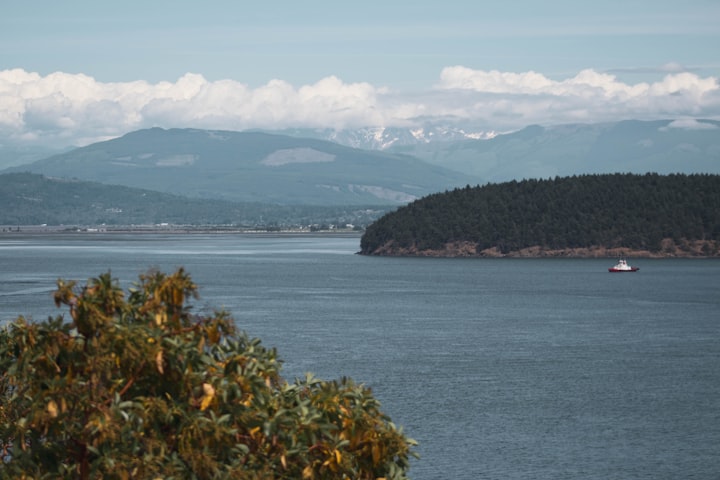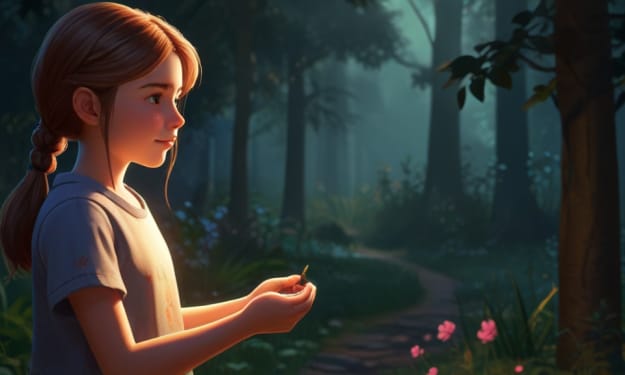
Bats live under the cedar siding of the cabin, weather and wear having long since left openings just large enough for them to flit through. On warmer evenings, just around twilight, they venture out, small shadows dancing in sharp, sudden movements against the cool purple-grey of the sky.
A large piece of curved, knotted drift wood, painted the year Nana discovered turquoise spray paint, emerges from the earth on the right-hand side of the house to form a railing along the steps to the half-split door of the mudroom attached to the structure’s side. It smells like rusted nails, old dirt on shovels, and dried out firewood.
The door to the cabin, a dark, warm red, requires a strong shove to push it open and has a loose gold knob with a square of duck-tape on it for ‘grip.’ On greyer days, the milky light filtering through the windows lining the cabin’s front wall is just enough to illuminate the edges of the main room. Even when all the candles are lit—in the chandelier above the table, kitchen, low alter table by the door, and any available surface—the cabin always maintains a balance of light and shadow. It can take a day or two to sink into; first reaches to grab canned foods from the kitchen’s shelves can be fumbling, but the eyes adjust to living with less sight and more sensing. The stairs to the loft take adjusting too, the large gaps between the rungs, some wedged more loosely than others between the two thin trunks of young trees Dean cut down, take learning. When the cabin has been empty a while, it smells musty at first, like the still air of a long-shut place just opened. But once the fire wood in the stove has been lit and the walls begin to heat, its true smell returns. Musty a tad, yes, still; but thick and warm and comfortable--the smell of content, full silences, like the air that hangs between the silent shelves of old libraries or around the candles in the chapels where prayers are whispered. Air to be held by, not moved through; air breathed deep and slowly.
Nana bought the land with her college savings; fifteen acres on Mt. Douglas, the largest hill on the island. She built the cabin with Dean while pregnant, the wall around the foundation built up with concrete and Dean’s empty bottles.
Dean would take the car battery out of his Barracuda some Sundays and plug it into the 10-inch black and white tv so my mother and aunt could watch the cartoons when they were young. When my mother had told me that story, I pictured them as they’d looked as children in the photo’s I’d seen, kneeling in the dirt of the driveway, elbows on the ledge of the open trunk, faces in hands.
For my childhood, long after Dean had died and Nana, my mother and aunt had moved to the city, that car sat empty in a clearing to the side of the road; each year I returned, I found a little more rust, a few more blackberries and ferns pushing up through the metal. Fond memories of Dean were always balanced with the darker ones; pieces of a grandfather I’d never met littered through the land, glittering in the sun as its beams strike circles of blue and green and foggy glass held suspended in gritty grey.
The goat pen where my mother learned to care for animals and how to kill them gently, how to strip them of their skin and prepare their flesh, learning each part and how they held together. The goat pen where Dean grew cannabis once, a much more forgiving smell than my mother’s memories of him crushing and distilling the milk of the island’s poppy’s into shitty heroin.
It took a long time for my mom to tell me many of her childhood stories of the island, and there is much she still withholds. "Trauma doesn’t need to be passed down" my mother says. Exploring those woods each summer was an expedition of reconstruction; each pile of long forgotten things found tucked away a piece of my mother, of who she was there.
But we all have pieces there now; my cousin’s “magic rainbow house” that now seems small to my newfound height and sits slowing rotting away, the old outhouse that has long since been replaced, that Nana still visits sometimes despite the family’s concerns about its lack of structural integrity.
The roses I painted on her mother’s old bedroom wall. Things placed and forgotten, sometimes found again--- layers of 3 generations of lives sink deep into this land’s soil.
About the Creator
Falen Wilkes
Writer. Poet. Hopeless Romantic who is terrified of love. At home by the seaside and deep in forests.






Comments
There are no comments for this story
Be the first to respond and start the conversation.